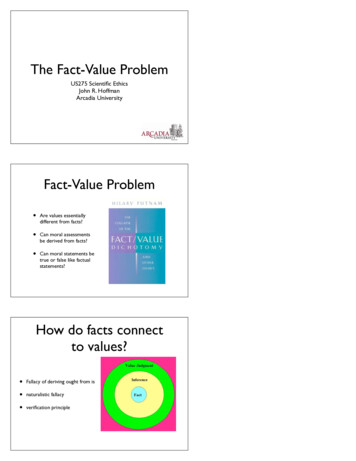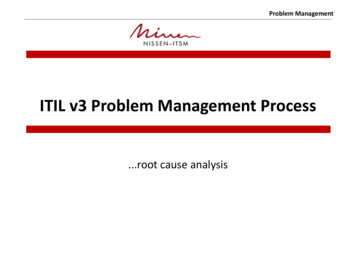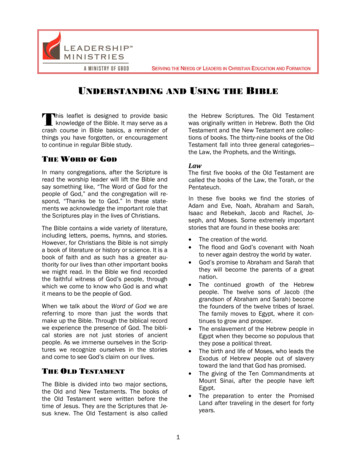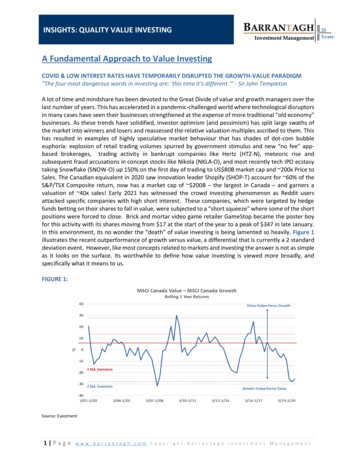
Transcription
The Fact-Value ProblemUS275 Scientific EthicsJohn R. HoffmanArcadia UniversityFact-Value Problem Are values essentiallydifferent from facts? Can moral assessmentsbe derived from facts? Can moral statements betrue or false like factualstatements?How do facts connectto values? Fallacy of deriving ought from isnaturalistic fallacyverification principle
Fallacy of transition from“is” to “Ought” Fundamental mistake observations of specific facts from statement of “whatis”used to conclude statementsabout moral obligations to statements of “Youought to.”Hume’s solution to “fallacyof deriving ought from is” value judgments not rational deductionsemotivism: moral assessmentsemotional reaction tospecific factsPortrait of David HumeAllan Ramsay, 1766What is the definition of“good?” Pleasure Rational will (utilitarians)(Kant/Deontology)God’s commandments (Divine Command Theory)
Naturalistic Fallacy “good” cannot be defined “good” is a simple property similar to “yellow”value judgments involve intuitivelyrecognizing value (good) within observed factsGeorge Edward Mooreauthor of Principia Ethica, 1903Verification Principle statement is meaningful if and only if, it is verifiable(i.e. can be found to betrue or false)moral statements only expressions of emotionAlfred Jules Ayersauthor of Language, Truth, and Logic, 1936Logical Positivism Tautological statements true by definitionexample “Arcadia University isan educational institution”empirically verifiable statements based onobservations example “Arcadia University hasa castle on campus”
Cognitive statements statements that have factualcontent statements can be verifiedcan determine objectively ifstatement is true or falseNoncognitive Statements Fact-value problem value statements cannot pass acritical test of meaning. therefore, fail the verificationprincipleEmotivism value and moral statements lackfactual content Value and moral statements areexpressions of feelingsProblems with Emotivism verification principle is neither tautological orempirically verifiablemoral statements are emotionalexpressions and attitudes more than isolated viewsmoral judgements areuniversalizable
Problems with Emotivism Emotivist view ethical disagreements the result ofdifferences in attitudeHowever, there is a distinction having reasons for changing views cognitive decision to changeexternal causes result in a changeour view change in situationPrescriptivism Moral statements accept noncognitivist elementprescriptive function recommend that othersadopt an attitudeRichard Mervyn Hare Moral judgements areprescriptiveMoral judgments contain both descriptive elements factual statementunderlying facts about anactionprescriptive elements value statementguides behavior
Moral judgements arelogical Moral judgements contain is statements ought statements descriptive factsprescriptive imperativereturns to Hume’s fallacy ofderiving ought from isMoral judgements areuniversalizable provides formal structure to amoral code similar to Kantuniversalizability is a necessary andsufficient condition of a moraljudgement necessary condition - ifprinciple is more, then itapplies universally. sufficient condition - if aprinciple applies universally,then it is a moral one.Moral judgements arecentered on principles principles not rigid absolutesreasons for informingdeliberationprinciples necessary in order to apply moralcode to new situations
Problems withPrescriptivism statements that are prescriptive,logical, and universalizable open-endedtoo broadcan be applied beyondtraditional moral questionsno limitations on altering one’sprinciplesNaturalism moral terms linked to some naturalproperty utilitarians: pleasureegoists: self-interestvirtue theory: human flourishingpromote human betterment avoid natural tendency of societyto get worseThe Treaty of Penn with the IndiansBenjamin West, 1772AssignmentThe God Particle and morality?The Fact-Value problem examines the attempt to define and describe moralstatements using an objective and quantifiable (i.e. a scientific) approach.Religion assigns moral views in a relationship through faith to their God. In themovie “Angels and Demons,” scientists isolate the God Particle in an attempt tounderstand the origins of the universe (the moment of creation).There is muchin the natural world that is not currently understood using a scientific approachand scientists have “faith” that they can learn the answers with additionalobservations of things such as subatomic particles or antimatter.In your discussion group: In your small group, discuss whether or not it ispossible to combine religious faith with scientific laws to provide the basisfor morality.
ReadingsChapter 11 The Fact-Value ProblemPojman & Fieser, (2009) Ethics:Discovering Right and Wrong. pp.188 - 208.The Reading StatueMississippi Agriculture and Forestry MuseumAny Questions?Email me s.com/images/animated-question-mark.gif23
Cognitive statements statements that have factual content statements can be verified can determine objectively if statement is true or false Noncognitive Statements Fact-value problem value statements cannot pass a critical test of meaning. therefore, fail the verification principle E










